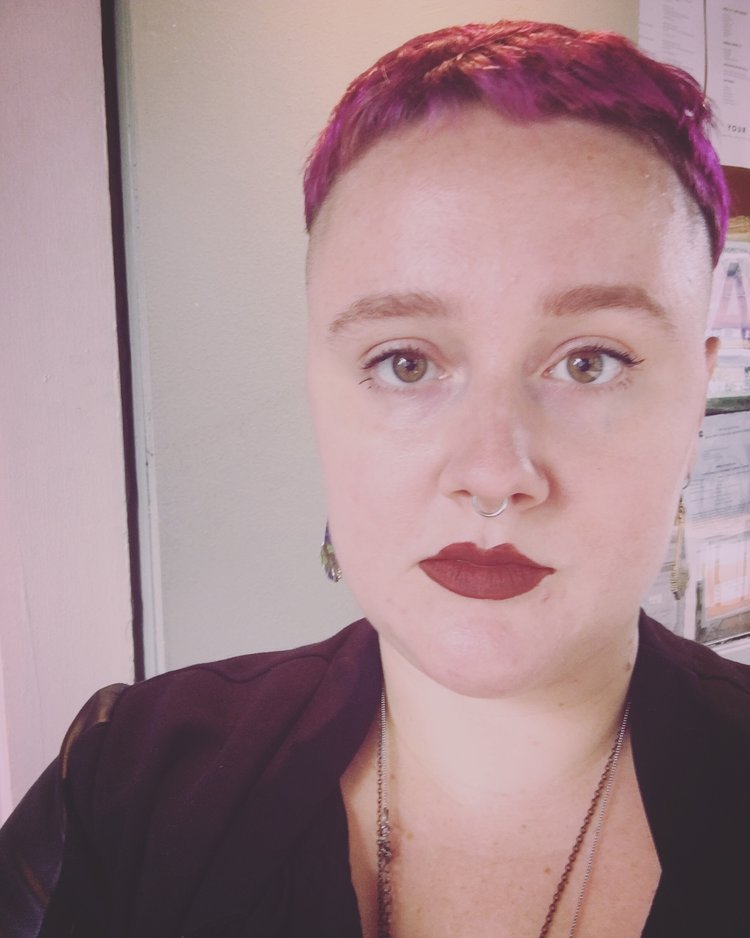Is this a coming-out essay? / This is a coming-out essay.
I don't come out as non-binary / a_gender / genderqueer person (for me, all doing the same disruptive thing) for the majority of my life. I feel icky that any move towards neutrality is only possible because of my privilege: educated, white, cis (cis-passing?); so I don’t.
Last month, I was awarded a 5-year fellowship for PhD study. This includes a $26K annual award connected to part-time academic labor as research assistant, instructor, fellow. To me, this marks my induction into middle-class opulence. Now I have institutional backing. I have clout and resources. I teach writing at selective NYC colleges. I have nice clothes (well, nice and on sale) and can buy lunch out with colleagues. I recently paid a $12 submission fee for a poetry manuscript contest.
I still feel like a waitress/waiter (server?) making $7.50/hour plus whatever yuppies from Long Island feel like tipping while I pour sweat into my crop top and mini-skirt, by far the fattest member of the staff, incapacitated by chronic pain, by panic I suppress with tequila and cash.
I wear lipstick and feel like a fraud. Masc-of-center queers leave me huge tips and I think I must be doing something right.
It is one year later and I have two dozen poem publications, a chapbook, another on deck, book reviews. I am a writer, I guess. Haven’t I always been a writer? Now it shows up on my CV, in conversation; my writing center job is buying copies of my books.
I have a conversation on Twitter about how weird I feel that my first chapbook was published by an explicitly queer and trans press, how I am queer but I am not trans, probably, but I’m probably not cis. I feel icky submitting to journals for trans writers (am I one of these? I don't use this term for myself because I do not need protection, I am employed, I am left alone on the train, I use pronouns that everyone recognizes as real, I can use the restroom without threats, without harassment or violence). My girlfriend even asks: are you a girl today or what? and I don’t know, I gulp, giggle, who knows. I use the women’s room because of course I do.
If I am not one thing, am I automatically another? Often, yes.
Not masc = femme.
Not abled = disabled.
Not trans = cis (???).
At the same time, my messy gender is already granted space by queer culture: white genderqueer AFAB people are the boutique icons of gender nonconformity, non-binary-ism. I am allowed to wear blazers, rock almost-shaved hair, clomp around in boots, and I’m seen as professional because all writing adjuncts are white AFAB people in blazers and boots.
Recently, an ex-friend wrote a piece about stopping testosterone, about how their version of transness had shifted to a kind of transition that isn’t medical. Immediately, their Facebook wall filled with applause: good for you, disrupting the gender binary, said their cis and trans masc friends. A cis man who misgenders trans women “to make a point”: thank you for writing about the authentic trans experience.
Implication: medical transition is invalid.
Implication: white trans masculinity is the authentic form of transness.
Implication: trans women are doing gender wrong.
I want to smash his face in.
Cute AFAB people on my Instagram feed rock “Gender is Over” and “The Future is Female” shirts. (It isn’t, and it isn’t.) I resist the compulsion to leave a derisive comment and instead I unfollow.
Coming out as a gender that's privileged, as my perceived gender is already privileged, is messy: white AFAB gender fluidity is still cis-passing, thin, abled, wealthy, “androgynous.” But finding solace in reclaiming my own hard-won queer femmeness is a reminder that femmeness is not available to others as it is to me. Neutrality isn't neutral if it skews masculine. I try to feel less of a fraud in my lipstick; I remember I'm able to disrupt because of these privileges, so I do.
But when my lilac nails match my glittery lavender cane, it is not an accident.
---
Jesse Rice-Evans is a queer Southern poet and rhetorician based in NYC. Read her work in the chapbooks Soft Switch (Damaged Goods Press) and The Rotting Kind (Ghost City Press), and online at Heavy Feather Review, Public Pool, and Quaint, among others.
Archive
- February 2025
- November 2024
- October 2024
- September 2024
- August 2024
- July 2024
- June 2024
- May 2024
- April 2024
- October 2023
- July 2023
- June 2023
- May 2023
- April 2023
- March 2023
- February 2023
- June 2022
- April 2022
- March 2022
- January 2022
- December 2021
- October 2021
- September 2021
- August 2021
- July 2021
- June 2021
- May 2021
- April 2021
- March 2021
- February 2021
- January 2021
- December 2020
- October 2020
- September 2020
- August 2020
- July 2020
- June 2020
- May 2020
- April 2020
- March 2020
- February 2020
- January 2020
- December 2019
- November 2019
- October 2019
- September 2019
- August 2019
- July 2019
- June 2019
- May 2019
- April 2019
- March 2019
- February 2019
- January 2019
- December 2018
- November 2018
- October 2018
- September 2018
- August 2018
- July 2018
- June 2018
- May 2018
- April 2018
- March 2018
- February 2018
- January 2018
- December 2017
- November 2017
- October 2017
- September 2017
- August 2017
- July 2017
- June 2017
- May 2017
- April 2017
- March 2017
- February 2017
- January 2017
- December 2015
- November 2015
- October 2015
- September 2015
- August 2015
- July 2015
- June 2015
- May 2015
- April 2015









